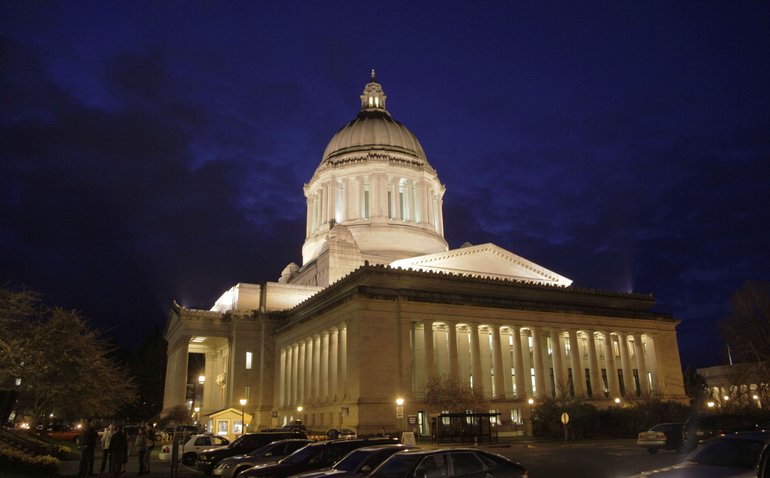Education funding ruling stirs glee, concern local
SEATTLE — The Washington Supreme Court ruled Thursday that the state isn’t meeting its constitutional obligation to amply pay for basic public education, but the justices gave an endorsement to the reform work the Legislature has already started.
The 85-page opinion said, however, that the judiciary would keep an eye on lawmakers to make sure they fully implement education reforms by 2018.
“The court cannot idly stand by as the legislature makes unfulfilled promises for reform,” Justice Debra Stephens wrote in the majority opinion. She notes that deadlines for reforms keep getting moved back and if left up to the Legislature, the court expects the delays would continue.
Lawmakers, who convene next week for a 60-day session, will also need to focus on what to do about a nearly $2 billion dollar budget shortfall.
The Supreme Court made a point of saying any future cuts to education must be done for educational reasons, not because there is a fiscal crisis.
The court made it clear the Legislature has to pay for education first, before any other state program or financial obligation, said attorney Thomas Ahearne, who represented the coalition of school districts, parents, teachers and community groups who sued the state
Stephanie McCleary, the mother of two school-age children whose name was on the lawsuit, was ecstatic about the ruling.
She was 13 years old when the Supreme Court last decided in 1978 that the state was not fulfilling its duty to the children of Washington. McCleary said she was especially pleased that the court plans to keep watch over the Legislature so the situation wouldn’t drag on for another 34 years.
“It’s a great day for the students in Washington state,” McCleary said. “I just couldn’t be happier. It’s been a long process.”
The coalition won a lawsuit in King County Superior Court in February 2010. Judge John Erlick ruled the state was violating its constitution by not fully paying for basic education.
The state appealed, saying Erlick reached beyond the high court’s previous ruling on this issue in 1978. Attorney General Rob McKenna said Thursday the state also sought guidance for the Legislature about how to meet its constitutional duty. He called the decision helpful.
In the strongly worded conclusion of the ruling issued Thursday, the court outlines the ways the Legislature has failed to meet its obligations — by talking about reform but cutting school funding at the same time.
The court does not lay out a plan for maintaining oversight, and Stephens acknowledges that work won’t be easy.
“While we recognize that the issue is complex and no option may prove wholly satisfactory, this is not a reason for the judiciary to throw up its hands and offer no remedy at all,” she wrote.
Seven justices signed the majority opinion, and two signed a partial dissent.
In the dissent, Chief Justice Barbara Madsen disagreed with the majority on the issue of who should make sure the court’s decision is carried out.
“We have done our job; now we must defer to the legislature for implementation,” she wrote, noting the Supreme Court set a precedence of having the Legislature do this work when it ruled in a 1978 decision on a similar case.
“The means of compliance are firmly within the realm of legislative power,” Madsen wrote. She said the majority claims that the judiciary will “facilitate progress” by maintaining authority over the case but then fails to say how it will do that.
Ahearne, the attorney who represented the coalition of school districts and community groups, said he appreciated the fact that the court asked the attorneys on both sides to make suggestions about the most efficient way for the court to stay involved.
House Speaker Frank Chopp, D-Seattle, said the priority this legislative session will be to maintain current funding for basic education and then take a look at what should be the next steps in education reform.
Senate Majority Leader Lisa Brown, D-Spokane, said there are valuable education programs outside of the basics that may still be in danger of losing state dollars, including levy equalization, which gives financial help to property-tax poor school districts.
“Simply protecting basic education does not mean there won’t be some significant cuts,” she said Thursday morning at The Associated Press legislative forum in Olympia.
Brown said the Supreme Court could help out the Legislature by taking a closer look at the constitutionality of a citizen initiative that forces lawmakers to get a two-thirds vote on any tax or fee change.
Gov. Chris Gregoire said one of the next steps should be finding a more stable source of money for education in Washington state.
“This ruling reinforces my call for a half-penny sales tax increase to invest in education,” she said in a statement, although the ruling does not mention the tax increase.
“If we don’t, we take a step backward and not only threaten a violation of the court’s ruling, but make it more difficult for students to gain the skills and knowledge needed to compete in today’s global economy,” the governor said.
Superintendent of Public Instruction Randy Dorn said the ruling reinforces what he’s been saying for years, that education funding is not adequate and further cuts are out of the question.
Dorn thanked the court for issuing its ruling before the 2012 Legislature convened.
“The court understood that the issue of education funding is too important to Washington state to have waited until the end of another session,” he said.



